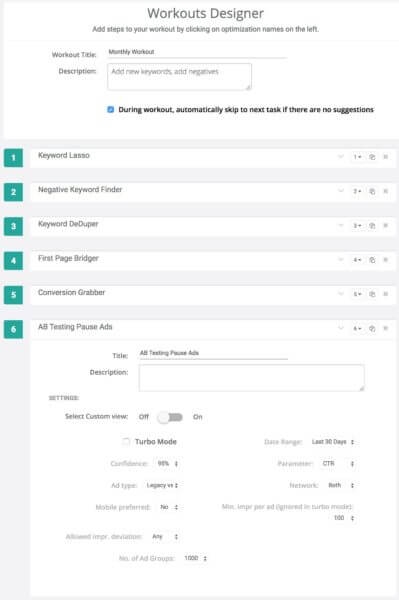Four ways to remain productive when the AdWords interface changes
Advertisers can leverage different workflows from tools like Optmyzr to be productive as the AdWords interface undergoes its major redesign.

The new AdWords interface is creating quite a stir in the PPC industry because, while it’s pretty, it’s disrupting the work of lots of PPC professionals. A Mona Elesseily says, “[T]his is a workhorse for many of us, not a viewing platform.” Fortunately, advertisers who use third-party tools like Optmyzr have a chance to transition their workflows more gradually than those who rely entirely on the tools Google provides.
At Optmyzr, we know that our PPC optimization software must do two things really well: save time and improve performance. Over the years, we’ve learned that achieving these goals requires different interfaces for different account managers. In other words, one solution does not fit all.
Because so many Optmyzr users are experts who do PPC for a living, the tools tend to have lots of ways to tweak things based on individual strategies. But even users who leverage all the customizations sometimes just want a prebuilt solution that leverages the wisdom of the entire industry. Time is often their most constrained resource, so choosing which tool to use is about optimizing time efficiency and gains in performance.
Optmyzr recognizes that account managers have limited time and will make informed decisions about which workflow is best for each scenario. Here are four ways Optmyzr gives account managers more choice about how to optimize their own time while still driving improvements in PPC on AdWords and Bing Ads.
Go broad with quick win optimizations
As much as PPC pros might want to spend a few hours to make an account perfect, the reality is that they are pulled in many directions, and it can be hard to devote more than five minutes to an account at a time. Luckily, small improvements can still pay off handsomely if they are done frequently.
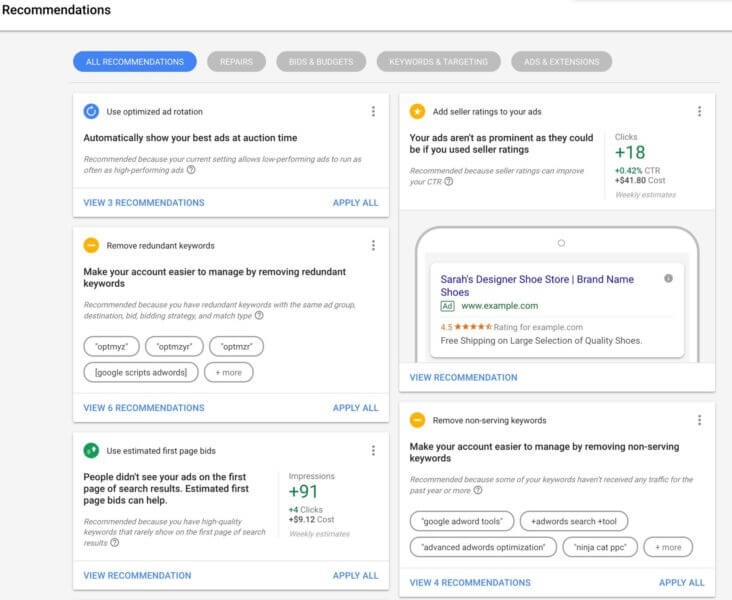
In AdWords, a quick win might consist of tackling one of the suggestions in the Recommendations section (known as the Opportunities tab in the old interface).
There are several third-party tools that follow this quick-win strategy from Google. At Optmyzr, we recently launched Optmyzr Express to give advertisers access to more quick wins, and we added an easy-to-use inbox-style format.
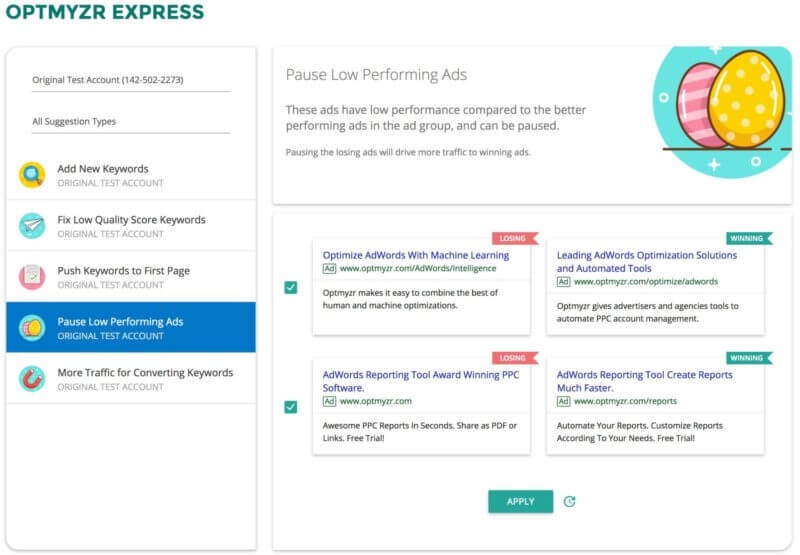
This makes Optmyzr Express really fast, because our algorithms find new suggestions every day. When an account manager logs in, all the data is already cached and ready for instant action.
The optimizations are also very focused, so rather than going deep and fixing everything, they prioritize the highest-impact changes, making it very easy for the user to see everything that will be changed in the engine as soon as they click the “approve” button.
Go deep with One-Click Optimizations™
The second strategy is useful when a bit more time can be devoted to an optimization and it’s possible to go deeper and fix a bigger portion of an account. Whereas quick wins need to be focused on the highest-priority opportunities, a deep dive based on a statistical approach can fix every opportunity, regardless of size. In AdWords, this might entail downloading several reports with all account data, combining them in Excel and creating an AdWords Editor-compatible file with the necessary changes.
A tool like Optmyzr automates all these steps and can analyze hundreds of thousands of search queries for an account and do things like automating the creation of single-keyword ad groups (SKAG) for the most promising terms.
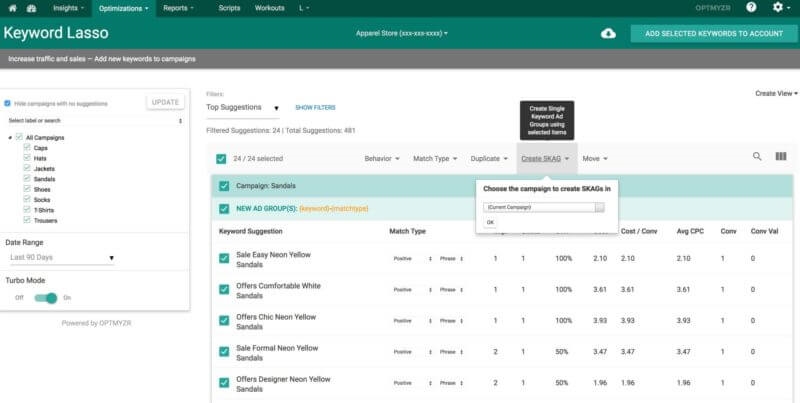
This was the original type of Optmyzr workflow, the One-Click Optimization™. We learned that as much as an algorithm can point to the validity of a certain suggestion, there are some things that are easy for humans to pick out that algorithms have a hard time with.
For example, an advertiser might scan a list of keyword suggestions and remember that they already tried these in another account a long time ago, or that certain keywords contain competitor names and there was a recent internal policy change about what to do with these types of keywords.
Unfortunately, those things that a human can pick out very easily are often highly dependent on the vertical, or even the advertiser’s own internal policies, so it’s hard to automate it in a piece of software. So, even though statistical optimizations are equally fast at generating one or a thousand suggestions, the time for a human to review the changes scales linearly.
Rather than trying to build the perfect algorithm, something that would be virtually impossible, we deploy optimizations that save time by doing all the pulling of reports, doing all the math and all the analysis, and we leave the final step in the user’s hands.
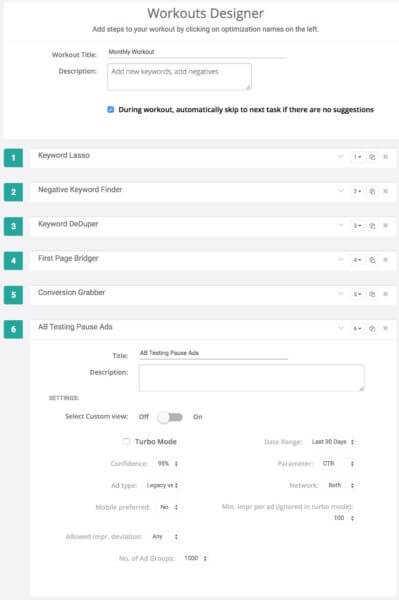
Go deep and broad with optimization checklists
The two previous scenarios have covered options designed for when time is severely limited. But what’s the best workflow when that limitation isn’t there? Agencies sometimes have employees whose primary job is to run through optimization checklists, and they tend to have more time than someone who also needs to run client meetings. They could spend a ton of time in AdWords or do things more quickly with Optmyzr’s One-Click Optimizations™, but we find that’s often not conducive to reliably high-quality results.
The reason is that account managers dedicated to optimization are often newer employees who may not have the same level of AdWords skills as their counterparts who are client-facing. For them, it can be confusing to know what to do when faced with advanced interfaces like those of AdWords or Optmyzr. Knowing exactly where to click, what columns to turn on, what date ranges to select and how to combine multiple reports to do a proper optimization is no simple task, so it may not be done consistently correctly.
That’s why Optmyzr developed Account Workouts, a customizable PPC workflow.

With Workouts, advertisers can add deep-dive optimizations to a to-do list. The benefit of using Optmyzr rather than a generic to-do list is that it’s deeply integrated with the PPC engines. When the account manager goes through the tasks of a Workout, they are presented with the right optimizations, in the right order, with the right settings for the strategy defined by the account owners, and the right columns are shown to help inform the final decision on which suggestions to accept.
Go on vacation by putting AdWords on autopilot
Finally, what about the scenario where we literally have no time, perhaps because we’re eager to take that long-awaited vacation. That’s where AdWords Scripts come in. We’re big fans of PPC automation at Optmyzr, but, as we said before, some automations are risky because it’s hard to build an algorithm that picks up on every nuance of a business, the way a human easily would. That said, there are plenty of PPC tasks that really don’t need that final layer of human approval since the task is so clear-cut.
Take budget management, for example. The business strategy may inform some of the complicated decisions about where to allocate budgets, but once the strategy is locked down, the task of making sure budgets are spent correctly is mostly a matter of checking the account spend frequently and rebalancing budgets as needed. That’s entirely automatable.
For these types of tasks, AdWords Scripts are ideal. They can check an account every hour and take the appropriate actions, whether that’s sending an email about a keyword with runaway spend, pausing a campaign that has depleted its monthly budget or generating a back-office report about the performance of the different keyword match types.
Optmyzr’s co-founder, Fred Vallaeys, has written several free scripts that you can find on this site, and Optmyzr also maintains the freeadwordsscripts.com blog. Anyone looking for an even easier way to get started with scripts can use Enhanced Scripts, which require no knowledge of programming whatsoever.
PPC pros need different ways to optimize accounts, depending on how much time they can devote to the task at hand. That’s why Optmyzr has created a variety of workflows to help account managers be more effective at their job. During this period of transition, where legacy workflows anchored to the old AdWords interface will have to be updated, we hope to provide advertisers another option to remain productive.
Marketing Land – Internet Marketing News, Strategies & Tips
(38)

